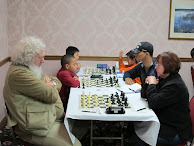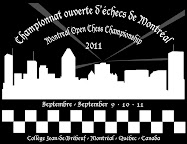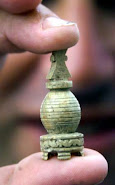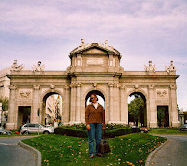 From the Harvard University Gazette Online:
From the Harvard University Gazette Online:Maggie Spivey: Archaeologist, comedian, princess
By Emily T. Simon
June 5, 2008
FAS Communications
Walk past Maggie Spivey in the Yard or on the streets of Cambridge, and you might find her with head down, eyes glued to the ground. She’s not being anti-social, or lamenting a flubbed grade — this dynamic archaeology concentrator just knows that often the most fascinating stories can be found underfoot.
Spivey, who hails from the small town of Hephzibah, Ga., didn’t arrive at Harvard with plans to study archaeology. But when she sat down with the “Courses of Instruction” book, highlighter at the ready, it soon became clear where her interests lay.
After she’d taken a whirl through the book, Spivey recalls, “Archaeology and social anthropology had the most items highlighted. So I figured that was a pretty good indication of where I should start.”
It proved to be a good strategy. Four years later, Spivey is graduating with a degree in archaeology and a wealth of fieldwork experience, including a dig in the Yard this fall to find remains of Harvard’s Indian College.
Spivey’s fascination with the past — in particular the history American Indian culture — stems in part from her own unique family background. She is a member of the Pee Dee Indian Nation, a tribe that originated in the southeastern United States. The documented history of the Pee Dee Nation dates back to the Revolutionary War era, when six Pee Dee men served in the company of Continental Army Lt. Col. Francis Marion, also known as the “Swamp Fox.”
The Pee Dee Nation had a reservation in South Carolina until the 1840s, when they were run off the land by a rival tribe.
“The federal government offered no help,” Spivey explains, “so a lot of the tribe members moved into cities and began mixing with the people of European descent who lived there.”
Today, descendants of the original Pee Dee tribe can be found primarily in South Carolina as well as mid- and southern Georgia. Spivey says she has been proud to bring their heritage a bit farther north, to Harvard.
For the past six years, Spivey has served as the princess for the Pee Dee Nation. Her role is primarily ambassadorial: She represents the tribe at cultural events in the area, and helps to raise awareness of Pee Dee culture. At Harvard she has extended her responsibilities to support Native American culture more broadly. Spivey is actively involved with Native Americans at Harvard College, and has participated in the annual Harvard Powwow. She also serves on the Undergraduate Minority Recruitment Program to encourage Native American high school students to apply to Harvard. In addition, Spivey has worked at the Peabody Museum as a research assistant, providing support for cataloging, tours, and visiting scholars.
In between her study and work responsibilities, Spivey still finds time to cut loose with the Immediate Gratification Players (IGP), an undergraduate improv comedy troupe.
“I really like making people laugh,” says Spivey. “It just makes me happy. If I can brighten someone’s day, I will always try to.”
Along with her fellow IGPers, Spivey acts in several shows a month, produces videos, and organizes special events such as comedy dinner parties. The troupe specializes in “long form” comedy, in which players build on audience suggestions to create a series of hilarious — but believable — scenes.
“We aim to create amusing relationships onstage,” says Spivey, “which I think is a good way to cultivate humor. We don’t fall back on ‘crutches’ like pop culture or off-color jokes, but instead try to show how everyday interactions between people can be funny.”
When she talks about performing with IGP, supporting the Pee Dee Nation, or the nuances of archaeological research, it’s clear that Spivey has found her place at Harvard. She adores her castmates, is proud of her work for Native Americans, and demonstrates a passion for her studies. But as a first-year student, Spivey wasn’t quite so confident that Harvard was right for her.
“I come from a rural town in Georgia that has only two stoplights,” she said. “I attended the same high school as my mom and my grandmother. So I was totally taken aback when I first arrived in Cambridge — the culture seemed remarkably foreign and I felt a thousand miles away from home.”
Spivey, who is the first in her family to attend college, gradually found ways to make Harvard feel more like home.
“It took a while, but I finally got used to everything — and my accent has certainly changed,” she quips.
This summer, Spivey will strike out even further afield. She’s headed to Benin, western Africa, for a five-week archaeological dig.
“The project is focused on historic Africa, or the Africa of the past few hundred years,” Spivey says. “It primarily involves survey work.”
Spivey and her colleagues will comb the landscape, picking up items of historical significance, such as pieces of ceramic. Then, they will evaluate what has been collected and record the location of each artifact.
“People often miss these items because they can appear to be trash, but there are such rich materials if you only stop to look closely!” Spivey says.
Spivey will manage the computer aspect of the project, processing the information and recording it in a geographic information system (GIS).
Following the Benin trip, Spivey will return to the United States and look for a one-year position in archaeology. She will use that time to evaluate whether she should continue to work in archaeology and pursue a Ph.D. in the field, or switch gears and attend law school. [DON'T DO IT]
“I have always thought it would be interesting to be a public prosecutor,” Spivey says. “To me, the process is very similar to archaeology — you are picking up pieces of evidence and putting them together to draw a meaningful conclusion.”
If she chooses the archaeology route, Spivey says, she eventually hopes to star in a television show.
“I don’t want to be a female Indiana Jones,” she says, “but I would love to participate in an authentic production that conveys the excitement of archeological research.”



































No comments:
Post a Comment